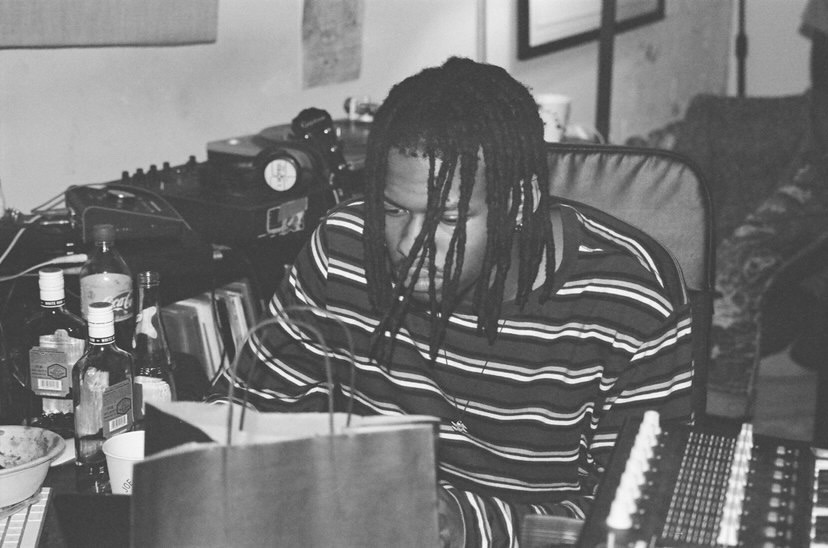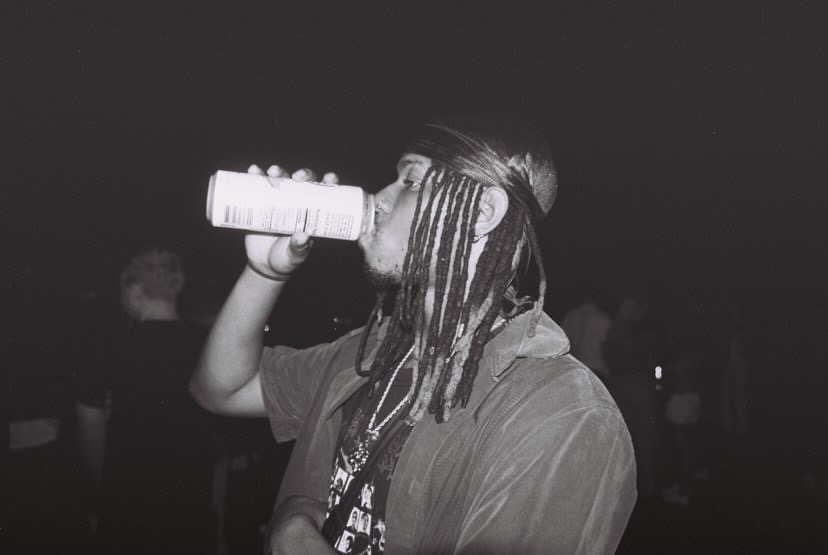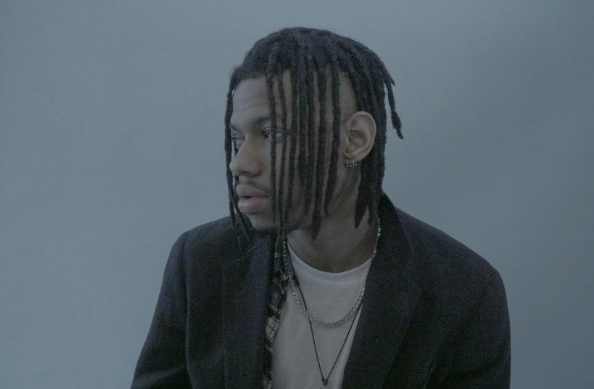BY ELI KIMBELL | If you’ve ever spoken at length with any of the employees at the Joe & the Juice at Sixth Avenue and 55th Street, you may be aware that it represents a makeshift foundation for a young community of creatives in the city. If you haven’t, you might leave with a ridiculously expensive green smoothie and a hopeless, melancholic nostalgia for the New York of old, when Andy Warhol’s Factory was the watering hole of the creative revolution of the 1960s.
If you know Ruben Coach, onetime general manager of this Joe & the Juice, you might be inspired to shed your melancholic color in favor of a brighter hue, with the knowledge that an underground creative community is very much alive and well in the city. But I only kind of know Ruben Coach — and what I did know about him gave rise to my suspicions that this community existed, and was right under my nose. But I couldn’t be sure, and so I asked.
“Yeah…definitely. That’s exactly what’s going on!” he replied, followed by a beat, and then a laugh.
My suspicions were confirmed. I knew that Ruben Coach was a part of this creative community, but not much else, other than how I once knew him as a middle schooler, and what I have seen of his social media presence over the last decade. I only kind of know Ruben Coach, and he explained to me that this level of familiarity is not uncommon among those with whom he crosses paths.
“I feel like people tend to have very specific perceptions of me,” he said. “Just the way I’m viewed on social media, the way I’m viewed in person, I feel like it’s all very different for me. I don’t know, I guess…I’m a real ‘you-can’t-read-a-book-by-its-cover-ass’ person. I don’t know why. My entire life, people are so set on the ideas of me, and I invite people to hang out with me and break those ideas.”
Perhaps his awareness of those half-baked perceptions was shaped by people such as his teachers and administrators at All Hallows, a Catholic high school, in the Bronx. They saw him as the gangly basketball player in the back of the classroom who never had the level of care for knowledge necessary to lift his gaze from his composition notebooks filled with self-authored rap lyrics. Or, in Coach’s more eloquent terms, they saw him as “a dickhead who never paid attention.”
What may have been taken as laziness or outright disrespect for figures of authority (and the voice of God that spoke through them) was really the beginning of a careful search for understanding far beyond anything Coach could glean from “Corinthians” or “Romans” alone.
Or perhaps his awareness was shaped by this original foray into deeply introspective analysis, in the form of chicken-scratched rap lyrics.
“I wrote a line, wrote how I was feeling,” he said of his first stab at songwriting. “And then the next line — just make it rhyme. It was very remedial shit, but here we are!”
As aware as he is of the two-dimensional versions of his character that others seem to want to concoct, Coach’s awareness of his own persona does not amount to any form of debilitating self-perception, nor does it foster any resentment among those who have painted portraits of him that simply do not exist. Instead, he welcomes the opportunity to gaze upon his past from a remove, making sense of his mental states at the time of certain events, but leaving the motivation for falsely fabricated images to the unknown, in peace. It is not important to him why people caricaturize him, but it is important to him that they have an opportunity to truly get to know him.
To be honest, I had my own half-baked perceptions of who he might be, based on what I had seen on social media since our eighth-grade graduation. To clue me in on the past that has drawn observers of his to incomplete conclusions, he laid out a timeline for me.
Coach was born in Brooklyn in 1998 before moving to Harlem for the earlier part of his childhood, then settled in Chelsea in 2006 where he has lived ever since. During Coach’s time at Lab Middle School, on W. 17th Street, from 2009 to 2012, his father pulled him out of school a couple of times a month to go live with a woman on a farm in Pennsylvania. To this day, Coach does not know how his father came to know the woman or why exactly he was sent there, apart from a guess that perhaps his father thought he needed a break from city life.

In Pennsylvania, he was “a little farm kid, a little church kid” and had six dogs, a pool and a playhouse. He did not attend school during these rural excursions, apart from religious school on Sundays, Saturdays and sometimes Tuesdays.
The woman he lived with was a “crazy religious lady,” he said, and although he doesn’t necessarily consider himself to be religious as an adult, he does consider himself to be spiritual. Coach never harbored any resentment toward the woman or his father for sending him there, instead maintaining a fierce loyalty to his dad and absolute trust that he would not send him anywhere that would not be good for him.
In 2012, Coach expressed interest to his friend Ade Sayyed in making music, though having little experience doing so apart from his “remedial” attempts at rhyming from the back of the classroom at All Hallows.
He knew Sayyed from “knowing people that knew him,” as well as his older brother, who attended Lab High School while Coach was at Lab Middle. Sayyed’s vision was set in stone by the time he was a high school freshman, and according to Coach, he has always known music was what his life would be. Sayyed’s positivity and stick-to-it-iveness brought Coach and similarly minded young artists into the fold around the city, which soon developed into [sLUms].
[sLUms] was a rap collective, similar in its primordial appearance to Odd Future, the L.A.-born group of rappers that catapulted the likes of Tyler, The Creator and Frank Ocean and Earl Sweatshirt to fame at the outset of the 2010s. What began as a group of friends and mutual friends freestyling on the subway and in bars wherever they could get a chance to tell their stories — whether anybody paid them or not — coagulated into a steadier stream of success in delivering their message to more widespread populations, eventually granting [sLUms] the opportunity to go on regional college tours and perform in an average of three shows a month by 2016.
Coach’s favorite year was 2016, and marked the era of his life in which he says he “fully bought in” to making music. He speaks about it with an intense nostalgia, and allows himself to reminisce about it, referencing different shows and how fun or weird or crazy they were, as well as adventures off the stage, like getting stranded Upstate in New Paltz.
But the memories are not the only thing Coach values about what 2016 and the [sLUms] era gave him. Memories are fun. But Coach cares for nostalgia itself, in the same way an art curator might don white cotton gloves to handle a priceless Van Gogh.
Nostalgia is built into his life, and his ability to recognize the power it gives him is evident in the way he has organized it in thought. When Coach speaks about his past, he speaks about it not by age, or grade, or larger swaths of time like “childhood” or “teenage years.” His memories exist in years, organized like the Rolodex of a man who has been in business with the same 24 people for his entire career.
If Joe & the Juice is a new Factory, then Warhol’s time capsule project is the evil grandfather of Coach’s organized mind. His mind is not burdened by the chaos that Warhol wielded, but motivated by the promise of emotional organization and sonic documentation.
He does not primarily think of his time at Joe & the Juice as his immediate post-high school years, or as the beginning of a new phase of his creative life and career. It’s the place where he met many of his current friends. Coach says there are 12 or so people that make up the creative group that began at Joe & the Juice, like Billy, a photographer, and Fonzo, a rapper and his “partner in crime.” It just also happens to be where he worked from 2016 until 2019.
As for Coach’s high school experiences, they were interrupted by what he dubbed an “excommunication” from All Hallows.
In 2020, Coach released an unmixed song and accompanying music video on YouTube called “So What,” which will be included on his upcoming project. “So What” is, by definition, a rhapsody. The first three minutes of the more than five-minute-long track are characterized by a plucky, reverbed, ’80s-style synth sound and droning vocals from Coach (or Jodi.10k, his stage name), accompanied by attacking toms that are reminiscent of early 2000s reggaeton and evaporate as soon as they emerge. The final minute and a half of the track devolves into a much darker second act, indicated by a reduction of 10 beats per minute from the tempo and accented by a heavy drumbeat underneath rhythmic, staccato vocals.
The intermission of the music video — a roughly 20-second-long rest — begins with only a black screen and an audio recording of a conversation between Coach and a few of his friends:
Wilhelm: Well, Carlos doesn’t identify himself as a guy. So it’s actually nine guys, nine girls.
Jodi: So nine girls, nine guys and one Carlos.
Wilhelm: There you go.
Without context, I assumed there had to be some kind of deeper meaning Coach intended by adding this recorded conversation, but when I asked him about it, he just tilted his head back and laughed.
“That was more of a Carlos decision,” he said. “He felt the need to. I don’t know. He shot that video… . That’s Carlos! It might mean something different to him, I’ll have to ask him. Carlos is definitely one of a kind.”
While there may not be a deeper meaning to Coach in the words of the interlude, its inclusion and Coach’s welcoming acceptance of Carlos’s creative vision is a testament to the deeper meaning that making and releasing music has to him. Often, artists feel that when they release music to the world, they relinquish spiritual ownership over it, and it then becomes individually owned by each of those who listen. But Coach doesn’t feel that way. If anything, he feels like releasing music ties it more closely to his soul, emboldening his relationship to it via the ability for others to connect to it, and consequently to him.
“Once I release it, I feel like it becomes more… mine,” he told me. “And if someone were to view it as if it was theirs, is that not somewhat of your intention? Every artist, we might make the art for ourselves — and at the end of the day, you don’t have to like it. But when someone loves it, there’s a certain kinship there that is just automatic, because clearly we have at least similar thought patterns or feeling patterns. I feel like it’s always mine. I’ve had it already — I sit on songs for years sometimes! Now you just know it’s me… . It can be you too! It’s a shared experience, like we’re watching a movie.”
Coach doesn’t want to be defined based on one song, though, or one emotion, and he doesn’t want people to make impressions of him as an artist that are not holistically formed, whether they like him or not.

Perhaps this is why “So What” is such a collage — a rhapsody. According to him, it is only indicative of “a direction I could go in.” But the song’s versatility also makes it difficult for anyone to make false impressions of who he is as an artist, and even Coach’s statement couldn’t be truly accurate, because his use of the word “direction” misleadingly lacks the defining “s” of plurality.
Whatever future version of Coach exists, it won’t be defined by any singular descriptor, like “rapper” or “student” or “general manager of Joe & the Juice” or “professional wrestler.” It will be Ruben Coach, the person. Take it or leave it, but whatever choice you make, it’s got to be an educated one, or else you’re truly missing out.
Yes, Ruben Coach, the professional wrestler. In 2009, his newly adolescent gaze pierced the thin veil of magic shrouding the reality of “Monday Night Raw,” the perennial WWE production that holds firm ground in the core childhood memories of more than a generation of (mostly) young boys, including Coach. And so he took an unknowingly necessary hiatus from watching, during which those memories could solidify into nostalgia. In 2014, he returned.
“I was just bored. I remember the day very specifically, actually, I was just bored as shit, it was Monday, and I was just scrolling through my TV, and I saw “Monday Night Raw,”” he recounted. “I was like, ‘You know what, I’ll just watch it. I haven’t seen it in years.’ And it was fiiiiirrreee.”
Five years later, his opportunity came.
“In like 2019, my boy Fonzo knew I liked wrestling, so he sent me one of his man’s Instagrams, and he was like, ‘Yo, check my boy out, he wrestles for this place,’” Coach said. “And I was like, ‘Alright, that’s fire then. Ask him whenever they’re taking new people, and I’m in there.’ So I was supposed to start around then but the pandemic came up. But he hit me up and said there was an open house, like last year, and I went.”
Since then, he has been “picking people up all day, putting people down, running, jumping, flipping…” at least twice a week during marathon training sessions at his wrestling school in Queens, out near LaGuardia Airport. Each session begins at 2 p.m., and often deposits him back at the 23rd Street A/C/E subway station close to 1 a.m.
“It’s one of the hardest things I’ve ever done,” he said, detailing the constant pain wrestlers-in-training endure to prepare for the next level, “but also one of the most fun things, easily.”
Over the last year, Coach has watched some of his fellow trainees start to get bookings at the professional level, some within a year and a half since they began wrestling. Consequently, he is aware that the beginning of his own wrestling career could be on the horizon, and his love for competition has fueled his cautious optimism, despite the fact that he self-identifies as a pessimist.
Perhaps more aptly, his friend and [sLUms] collaborator Ade Sayyed (stage name Sixpress) has awarded him the superlative of “the saddest, happiest person in the world.”
With his future in flux, Coach meditates calmly in this warm-hued pessimism, valiantly peaceful.
I asked if his vision for the rollout of his next album was partially motivated by a desire to achieve a certain level of success he has yet to taste.
“I definitely would invite the prospect of taking it to the next level,” he told me. “And you can! The rap industry — people will listen to anything, man, really more now than ever. I could have done so many things differently, to where I’d be in a different spot right now, but I also wouldn’t have. Because it would have taken a lot of doing things that just aren’t in my character. I’m content with that. I’m stubborn in this way… . I have to be. If it works out, it works out. But I know enough people, to where if I really just grinded grinded, and said, ‘I’m gonna do this,’ I could be chillin’. It’s really just up to me at this point.”
I don’t really know who Ruben Coach is. But he does, and he knows all of the Ruben Coaches that have ever existed. He isn’t certain about who the next Ruben Coach will be, however, and he’s more than content with that.
But there doesn’t have to be just one Ruben Coach, made up of parts of a life divided into boxes, or any singular, snap judgment. There can be many Ruben Coaches at once, all taking in the colorful world, documenting emotional memories in eternal nostalgia.
If you’d like to hear more from Ruben Coach (Jodi.10k), check out his music on Spotify, Soundcloud, Tidal, Apple Music and YouTube.


Be First to Comment